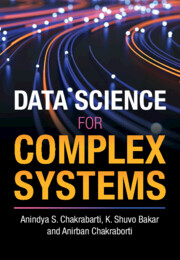
-
Select format
-
- Publisher:
- Cambridge University Press
- Publication date:
- 11 May 2023
- 25 May 2023
- ISBN:
- 9781108953597
- 9781108844796
- Dimensions:
- (244 x 170 mm)
- Weight & Pages:
- 0.7kg, 289 Pages
- Dimensions:
- Weight & Pages:
- Subjects:
- Physics and Astronomy, Research Methods in Sociology and Criminology, Research Methods In Sociology and Criminology, Statistical Physics, Sociology
You may already have access via personal or institutional login- Subjects:
- Physics and Astronomy, Research Methods in Sociology and Criminology, Research Methods In Sociology and Criminology, Statistical Physics, Sociology
Book description
Many real-life systems are dynamic, evolving, and intertwined. Examples of such systems displaying 'complexity', can be found in a wide variety of contexts ranging from economics to biology, to the environmental and physical sciences. The study of complex systems involves analysis and interpretation of vast quantities of data, which necessitates the application of many classical and modern tools and techniques from statistics, network science, machine learning, and agent-based modelling. Drawing from the latest research, this self-contained and pedagogical text describes some of the most important and widely used methods, emphasising both empirical and theoretical approaches. More broadly, this book provides an accessible guide to a data-driven toolkit for scientists, engineers, and social scientists who require effective analysis of large quantities of data, whether that be related to social networks, financial markets, economies or other types of complex systems.
Awards
Winner, 2024 Choice Awards
Reviews
‘Complex systems are a subject of popular interest thanks to the efforts of both academics and industry researchers during the last few years, and the 2021 Nobel Prize in Physics. This book is timely and it gives a comprehensive view of complex systems with an emphasis on data-driven contributions, ranging from economic and financial aspects to broader social science applications. Reading this book is a pleasure, and it provides a solid and robust understanding of the key topics in the field. This is a ‘must -read for anybody interested in complex systems’ and I strongly recommend having it on your shelf!’
Tiziana Di Matteo - King's College London, Complexity Science Hub Vienna, and Enrico Fermi Research Centre (CREF)
Contents
Metrics
Altmetric attention score
Full text views
Full text views help Loading metrics...
Loading metrics...
* Views captured on Cambridge Core between #date#. This data will be updated every 24 hours.
Usage data cannot currently be displayed.
Accessibility standard: Unknown
Why this information is here
This section outlines the accessibility features of this content - including support for screen readers, full keyboard navigation and high-contrast display options. This may not be relevant for you.
Accessibility Information
Accessibility compliance for the PDF of this book is currently unknown and may be updated in the future.


